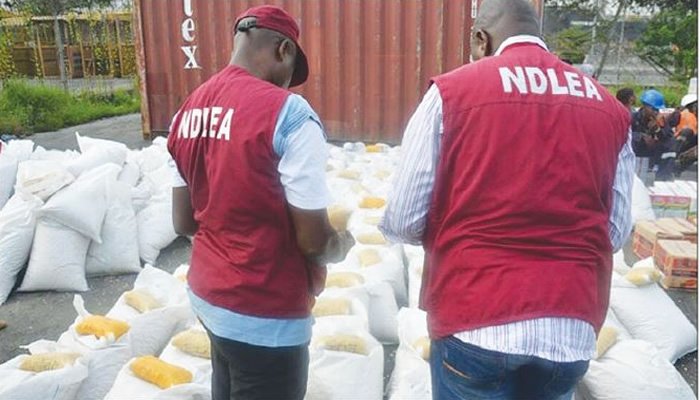The fight against hard drugs in Nigeria has proven to be a difficult and never-ending challenge. Despite increased efforts by law enforcement agencies, the tactics used by drug cartels continue to evolve. As these criminals develop new ways to smuggle drugs, such as using Korean shipping companies, the National Drug Law Enforcement Agency (NDLEA) must constantly adapt. The consequences of drug trafficking go beyond just the health and security risks—it has a significant economic impact on Nigeria, both domestically and internationally.
Juliet Jacob evaluates the new tactics being devised by the smugglers and the capacity of the enforcement agency to match up and expose them.


New Smuggling Tactics and An Endless Battle
One of the key observations in the fight against drug cartels is their growing sophistication. Smugglers have shifted from more obvious methods of transporting drugs to hiding them in everyday items like sanitary pads, hair treatment cream containers, and food products. This trend was highlighted recently, in a series of successful NDLEA operations in Lagos between September 2 and 6, 2024, during which officers intercepted shipments of cocaine, tramadol, and other opioids bound for the UK, Ireland, Cyprus, and South Africa.
Courier Services: A New Threat?
The increased use of courier services to traffic drugs has become a major concern for the NDLEA. The ability to hide contraband in cosmetics, sanitary products, and even food shipments has opened new avenues for criminals to bypass traditional security checks at ports and airports.

NDLEA’s Director of Media & Advocacy, Femi Babafemi, pointed out the scope of the problem, describing how the agency intercepted several large shipments within the first week of September 2024. Cocaine concealed in hair cream containers was intercepted en route to Ireland, while tramadol hidden in sanitary pads was caught heading to Cyprus.
“The level of sophistication we’re seeing in these smuggling operations is alarming, and we are keeping an eye on all means of transport, including courier companies,” Babafemi said.
Economic Consequences of Drug Trafficking
The movement of hard drugs in and out of Nigeria has profound economic implications. Firstly, it increases the financial burden on the country by fuelling organized crime and corruption. Smuggling operations drain resources that could be used to develop key sectors such as health and education. Furthermore, the international trade of illicit drugs tarnishes Nigeria’s reputation and could affect trade relations with other nations.
Drug abuse also has direct economic consequences on the population, particularly in communities where it is widespread. Addiction reduces productivity and increases the need for healthcare, social services, and law enforcement interventions. Additionally, funds that could otherwise be invested in legitimate businesses and economic growth are diverted into illegal activities.

Large Drug Seizures Highlight Scope of the Problem
A recent operation by the NDLEA in August 2024 showcased the immense scale of Nigeria’s drug trafficking problem. A total of 31 million opioid pills, including tramadol and codeine syrup, valued at N17.9 billion, were seized at the Port Harcourt Port Complex and Tincan Seaport in Lagos. These drugs, shipped from India, were hidden in cosmetics containers and other everyday items.
Major Operations and Successes
The NDLEA’s efforts to clamp down on drug smuggling have been fruitful. In September 2024 alone, NDLEA operatives, assisted by the Nigerian Army, destroyed over 100,000 kilograms of cannabis across 51 hectares of farmland in the Ise-Ekiti forest reserve, Ekiti State. Additionally, raids in various states led to the arrest of multiple suspects involved in smuggling tramadol, codeine, and cannabis.
In another major success, a wanted ex-beauty queen who had evaded capture for eight months surrendered herself to NDLEA officials in August 2024. She had been linked to drug smuggling activities in Lekki, Lagos, and her arrest was seen as a significant win for the agency.
“Our officers are doing an outstanding job, but the war is far from over,” stated Marwa. “The NDLEA is constantly pushing forward, and we will not rest until the drug trade in Nigeria is brought to an end.”
Conclusion: The Way Forward
The fight against drug trafficking in Nigeria is complex and ongoing. The NDLEA has made significant strides in intercepting drug shipments and arresting high-profile criminals. However, the rise of new smuggling tactics, especially through courier services, poses a significant challenge. As drug traffickers continue to adapt, Nigeria’s drug enforcement agencies will need to remain vigilant and innovative.
At the heart of this battle is the protection of Nigeria’s economy, reputation, and public health. Every victory against the drug trade is a step toward a safer and more prosperous future for the nation.



